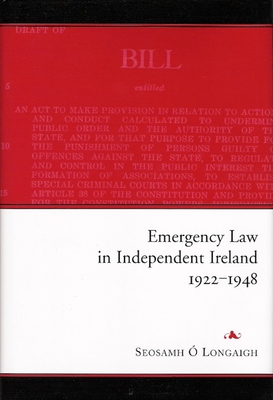Emergency Law in Independent Ireland
Ruaírí Ó Domhnaill reviews Emergency Law in Independent Ireland 1922-1948 Seosamh Ó Longaigh. Four Courts Press, ISBN 1 85182 922 9, £50 hbk

THIS IS an inspired, scholarly work.
Dwyer, Hart, Hopkinson, Bell, Fisk and others, have contributed to the portrayal of Irish history of the period, but Dr Ó Longaigh embarks on a uniquely successful strategy in historiography, which integrates legal, political and human perspectives. Further, he prompts examination of the psychology of power, individual integrity and, crucially, the relevance of Aristotle's Separation of Powers to modern states.
My main criticism is one of presentation. The work lacks headings, which would facilitate comprehension.
The author arranges his work in seven chapters: the Civil War (1922-24): Its Aftermath (1924-27): the Resurgence of the IRA (1927-32): Fianna Fáil in Power (1932-37): The New Constitution (1937-39): the Emergency (1939-45) and Conclusions.
To those interested in constitutional law, the chapter entitled 'The New Constitution' may raise hopes of a detailed analysis. Unfortunately, it is not within scope of 'Emergency Law'. (The 1922 and 1937 constitutions can be found on the Internet; all statutes and Oireachtas debates are also available there.)
But this is not a narrow 'legal' analysis; it details actions of the power-élite - the legendary, the merely famous, the obscure and the infamous. Regrettably there were few heroes. Occasionally, a judge like George Gavan Duffy emerged to defend natural law, the rule of law and the individual, against a ravening executive.
"Salus Populi Suprema Lex", (safety of the people is the highest law) was readily embraced officially. To Kevin O'Higgins, this was the 'only code. But breaches of public safety became 'Offences Against the State'; the principle metamorphosed into 'l'état, c'est moi'. The extremes of the executive were outstripped by the avalanche of blood-curdling exhortations of its civil servants. An attorney-general could be "shocked as a lawyer and a layman" at proposals but not sufficiently so as to resign. However he did progress to be miscast as minister "for justice".
The alternative title of this work might have been The Long Civil War. The target of all governments was the IRA and briefly, the fascist Blue Shirts. Fianna Fáil's onslaughts on its former comrades-in-arms were unmatched in spite.
My generation owes a particular debt to Dr Ó Longaigh; he demonstrates why we were taught that Irish history ended on 12 May 1916.
Connolly Association, c/o RMT, Unity House, 39 Chalton Street, London, NW1 1JD
Copyright © 2006

